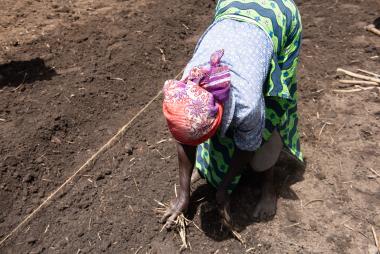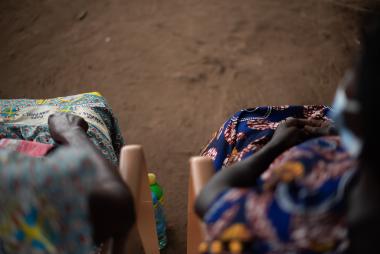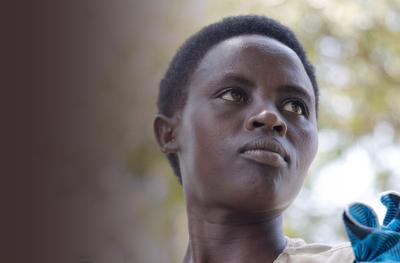
Trigger warning: Description of sexual violence
My name is Nsimire, and I’m 23 years old and a mother of one. I live in Katana village, located in the Chegere area of South Kivu, Eastern Democratic Republic of the Congo (DRC). When the war broke out earlier this year in February 2025 in Goma, I was shocked and deeply saddened by the numerous deaths and violence. I never anticipated that this conflict would escalate and spread to other parts of the country so quickly.
Before this latest escalation of the conflict, we felt safe and secure, and my soap business flourished. But within a few weeks, conflict spread to my village. The situation became increasingly dangerous, which forced me to pause my soap business. I chose to stay home and dedicate myself to my small farm, hoping to make ends meet in these difficult times.

One day, while working on my farm, a group of uniformed armed men approached me. They demanded that I stop what I was doing and follow them, leaving me uncertain and scared about what would happen next. They threatened to shoot me if I didn’t comply, and I had no choice but to carry their luggage—one on my back and one on my head.
We walked for hours, and I became tired. I tried telling them I was exhausted, but they ignored me and again threatened to kill me. After a few hours we were in the bush, and it was already dark; they said we would spend the night there. I put the luggage down, and I could only think of closing my eyes to sleep.
While I was sleeping, three of them approached me. Without saying anything, they raped me one after the other. I closed my eyes. I asked them why they did that to me, and in response, they began to beat me and took all the money I had hidden in my dress. They finally released me, and I walked for hours through the bush to reach a nearby town. I felt tired. I did not cry; I did not speak a word; I was still in shock.
Unfortunately, I was unable to access any health services within 72 hours of the incident because all healthcare facilities were closed due to the ongoing conflict. It was also too dangerous due to active gunfire. Healthcare facilities were being routinely looted and destroyed, medical staff were overwhelmed, and many lacked training in trauma care. Additionally, psychological support was, and still is, nearly nonexistent in most healthcare facilities.
Due to stress, I've distanced myself from my family and friends. I don’t want to burden them by sharing the ordeal I experienced. I might share what I went through when I eventually go back home, but for now, I prefer that no one in my family knows.

I came to know about a facility that serves as a safe space for survivors, established by Réseau d'Innovation Organisationnelle (RIO). They were partnering with Women for Women International to establish safe spaces for survivors. I was taken to one of these safe spaces, where I met other women who had gone through similar ordeals, and I was introduced to a mentor trained in handling sexual violence and providing safe referrals. With my mentor by my side, I felt comfortable enough to share my experience. I received psychosocial first aid (PFA) and a referral to specialized response services.
Once the situation had calmed down, I visited the health center that my mentor had referred me to. Unfortunately, the necessary services were not available, which increased my risk of contracting diseases. I felt anxious. The health center then referred me to the Panzi Foundation's mobile clinic, a one-stop center that provides survivors with all the necessary care in one location. This meant I didn't have to travel to different facilities to access the services. I received comprehensive medical treatment and psychosocial support discreetly and efficiently. This support has helped me heal, and I am now feeling much better.
Note: As part of the ‘Putting Survivors at the Center Project’, funded by USAID’s Bureau for Humanitarian Assistance (BHA), WfWI helped build the capacity of local organizations not specialized in gender-based violence to better support survivors who spontaneously disclosed experiences of violence. Since 2022, we have worked alongside the Global Women’s Institute at the George Washington University to research, develop and pilot test a range of new programming models in the Democratic Republic of Congo, Iraq and South Sudan focused on strengthening survivor-centered care. We were forced to end this project when USAID funding cuts were implemented in March 2025.
For security and privacy reasons, the participant's name has been changed, and photos are for representational purposes only and not of the program participant.
